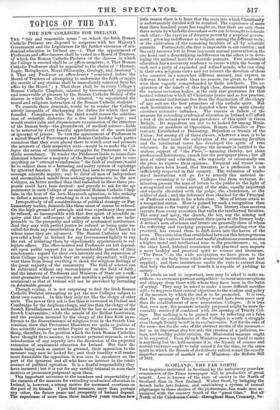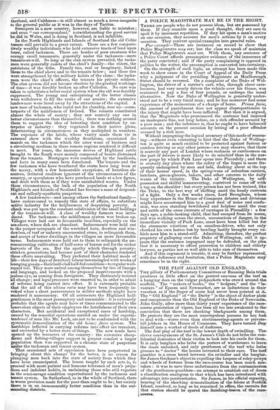SCOTLAND: THE FAR NORTH.
THE inquiries instituted in Scotland by the ambulatory poor-law commission of the Times newspaper will be productive of great benefit. Less is known of the state of society in the North of Scotland than in New Zealand. Walter Scott, by bringing the Scotch lochs into fashion, and establishing a system of annual pilgrimage to these shrines of the picturesque, has made men ac- quainted with the country South of the "great Glen." But all ' North of the Caledonian Canal—throughout Ross, Cromarty, Su- therland, and Caithness is still almost as much a terra incognita. to the general public as it was in the days of Tacitus. Strangers in anew country, however, are liable to mistakes ; and even "our correspondent," notwithstanding the good service he aid in Wales' and is doing in Scotland, is not infallible. In the North Highlands and Islands of Scotland the old Celtic tenure still prevails to a great extent. There are a few compara- tively wealthy individuals who hold extensive tracts of land upon lease, called tacksmen. There are hordes of poor creatures who occupy small tenements, generally under the tacksmen—mere tenants-at-will. So long as the clan system prevailed, the tacks- men were generally cadets of the chief's family—the elders, the patricians of the tribe. Family ties, real or imaginary, linked them to the chief above and to the tenants below; and these ties were strengthened by the military habits of the clans : the tacks- men were the chief's officers, the tenants his private soldiers. The clan system did not become obsolete by the gradual workings of time—it was forcibly broken up after Culloden. No care was taken to substitute a better social system when the old was forcibly suppressed. The young and enterprising of the better classes were withdrawn to fill the ranks of our armies ; the extensive landowners were lured away by the attractions of the capital. A new race of tacksmen, who cared not for clanship, rose up—coun- terparts of the middemen of Ireland. The tenants constituted almost the whole of society ; they saw scarcely any one in better circumstances than themselves ; there was nothing around them to suggest the idea of bettering their condition by en- terprise or industry : they vegetated in their native glens, deteriorating in circumstances as they multiplied in numbers. The expenses of the lairds, whose vanity made them vie in external show with the wealthy Southrons, occasioned de- mands on the tacksmen which the utter want of business and a. circulating medium in these remote regions rendered it difficult to meet. For years, the immense droves of Highland cattle brought to the South were mainly composed of beasts distrained from the tenants. Mortgages were contracted by the landlords, and have in many cases been foreclosed. The tenants and the few tacksmen who have weathered the storm have long been at the mercy, with a few honourable exceptions, of heartless ab- sentees irritated creditors ignorant of the circumstances of the country, or speculators who have purchased lands at a low figure, and dealt with them as if they were uninhabited wastes. Under these circumstances, the bulk of the population of the North Highlands and Islands of Scotland has become a mass of despond- ent and sullenly-apathetic pauperism. A few landowners—and among others the Sutherland family— have endeavoured to remedy this state of affairs, to substitute active industry for the helplessness of despairing poverty. A check was put upon the constant subdivision of the smallholdings of the tenants-at-will. A class of wealthy farmers was intro- duced. The tacksman—the middleman system was broken up. Villages were laid out in favourable localities, especially on the sea-shore, where fish are abundant. Inducements were held out to the pauper occupants of the wretched huts, doorless and win- dowless, of turf or unhewn uncemented stone, to relinquish them, and accept of better dwellings in the villages on more favourable terms. Inducements were held out to them to relinquish the un- remunerating cultivation of half-acres of barren soil for the richer harvests of the sea. But the apathy which through poverty- stricken generations had become part of their character rendered these efforts unavailing. They preferred their habitual mode of life—their few days of desultory labour intermingled with weeks of hiunginggossip—theirhalf-clad half-fed condition—to regular well- repaid toil. They were united among themselves by ties of lineage and language, and looked on the proposed improvements with a jealous eye, as coming from foreigners. They obstinatelyresisted all change; and legal processes were resorted to, in order to admit Of reforms being carried into effect. It is extremely probable that the aid of this ultima ratio may have been frequently in- voked when a short perseverance in milder methods might have rendered it unnecessary. Of all aristocrats the Highland half- gentleman is the most peremptory and unamiable : it is extremely probable that the agents may have at times communicated to the benevolent objects of their employers the hatefulness of their own characters. But accidental and exceptional cases of hardship, caused by the remedial operations carried on under the superin- tendence of men like Mr. Loch, are not to be confounded with the systematic demoralization of the old laissez faire system. The hardships inflicted in carrying reforms into effect are transient, and succeeded by a better state of things. The new roads have opened up the resources of the country : the extensive sheep- terms and fishing-villages support in greater comfort a larger population than was supported in a chronic state of pauperism under the tacksman and tenant system. That occasional acts of oppression have been perpetrated in bringing about this change for the better, is no reason for plunging men back into the state of society from which they have been emancipated. The lesson taught by such acts is, to proceed with more patient and humane tolerance of men's preju- dices and indolent habits, in reclaiming those who still vegetate in the semi-savage condition superinduced by the tacksman and tenant system. In Sutherland, as in the whole of Scotland, there is worse provision made for the poor than ought to be ; but society there is in an immeasurably better condition than in the sur- rounding districts.



























 Previous page
Previous page